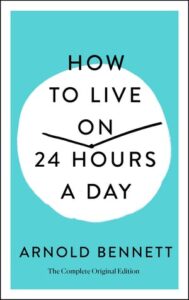How do we best spend our time? This book explores this important question. Most people squander time.

Are you addicted to social media? Do you control social media? or does it control you?
Unlike money, time is finite. Being able to seize the day and manage times is one of the most important questions. We can accomplish so much more and achieve our goals.
There are so many great quotes in this book, and it is relatively short, so it is a quick read and well worth a read. A few quotes are below.
You can download the ebook here.
Are you realising your potential? And are you achieving what you are capable of?
The chances are that you have not. The chances are that you have already come to believe that happiness is unattainable. But men have attained it. And they have attained it by realising that happiness does not spring from procuring physical or mental pleasure but from the development of reason and the adjustment of conduct to principles.
And if you admit it, and still devote no part of your day to the deliberate consideration of your reason, principles and conduct, you admit also that while striving for a certain thing you are regularly leaving undone the one act which is necessary to the attainment of that thing.
Do you actually spend your time well? He mostly talks about 1) reading, 2) reflection, and 3) living according to certain values
Newspapers are full of articles explaining how to live on such-and-such a sum…but I have never seen an essay ‘how to live on 24 hours a day.’ Yet it has been said that time is money. That proverb understates the case. Time is a great deal more than money. If you have time, you can obtain money-usually. But…you cannot buy yourself a minute more time.
You cannot draw on the future. Impossible to get into debt! You can only waste the passing moment. You cannot waste tomorrow, it is kept from you.
You have to live on this 24 hours of time. Out of it you have to spin health, pleasure, money, content, respect and the evolution of your immortal soul. It’s right use…is a matter of the highest urgency.
Do you have things that you wish you would do if you had more time? Or at a future time?
We never shall have any more time. We have, and we have always had, all the time there is
“It is always the man who has tasted life who demands more of it.”
I have found no such wonderful secret. Nor do I expect to find it, nor do I expect anyone else to find it. It is undiscovered… there is no easy way, no royal road. The path to Mecca is extremely hard and stony and the worst part is that you never get there after all.
You say your day is already full to overflowing. How? You actually spend in earning your livelihood – how much? Seven hours on the average. And in sleep, seven? I will add another two to be generous. And I will defy you to account for me the other 8 hours on the spur of the moment.
He persists in looking at the hours from 10 to 6 as ‘the day’ to which the 10 hours proceeding and the 6 hours following are an epilogue and prologue … this general attitude is illogical and unhealthy.
You calmly and majestically give yourself up to your newspaper. You do not hurry…your air is the air of a leisured man, wealthy in time, of a man from some planet where there are 124 hours in the day…I cannot possibly allow you to scatter such precious pearls of time with Oriental lavishness. You are not the Shah of time.
You are pale and tired…in an hour or so you sit up and feel you could take a little nourishment. And you do. Then you smoke, seriously, you see friends, you potter, you play cards, you flirt with a book, you take a stroll, you caress the piano…by jove! A quarter past eleven.
When you arrange to go to the theatre (especially with a pretty woman), what happens? You rush…you go. Friends and fatigue have been equally forgotten and the evening has seemed so long…can you deny that when you have something definite to look forward to at eventide, something that is to employ all your energy – the thought of that something gives a glow and more intense energy to the whole day?
Next, come some specific instructions on how we should spend our evenings. Bennett, echoing Machiavelli’s ideas, suggests employing an hour and a half each evening for cultivating the mind, which still leaves 45 hours a week for errands, adventure, and seeing friends. This is a practice which we can all employ if only we’d stop the mindless diversions of Netflix and Snapchat and exchange the time for a concentrated effort on something meaningful.
My contention is that those 7 and a half hours will quicken the whole life of the week, add zest to it, and increase the interest which you feel in even the most banal occupations.
The control of the thinking machine is perfectly possible. And since nothing whatsoever happens to us outside our brains, since nothing hurts us or give us pleasure except within our brain, the supreme importance of being able to control what goes on inside the mysterious brain is patent… people complain of the lack of the power to concentrate, not witting that they may acquire the power if they chose…mind control is the first element of a full existence.
When you leave your house, concentrate your mind on a subject (no matter what to begin with.) You will not have gone ten paces before your mind has skipped away under your very eyes and is lurking around the corner with another subject. Bring it back by the scruff of the neck. Ere you have reached the station you will have brought it back 40 times. Do not despair. Keep it up. You will succeed.
For starters, we can stop viewing our work as our lives and learn to distinguish the two or intertwine them. We can plan specific pursuits for our spare time, rather than flitting it away. We can take stock of how much free time we actually have and where it is going. Then, we can structure those hours and minutes to ensure they are used for something meaningful.
You can turn over a new leaf every hour if you choose.
And since nothing whatever happens to us outside our own brain; since nothing hurt us or gives us pleasure except within the brain, the supreme importance of being able to control what goes on in that mysterious brain is patent.
“One of the chief things which my typical man has to learn is that the mental faculties are capable of a continuous hard activity; they do not tire like an arm or a leg. All they want is change – not rest, except in sleep.”
“without the power to concentrate that is to say, without the power to dictate to the brain its task and to ensure obedience true life is impossible. Mind control is the first element of a full existence.”
“The second suggestion is to think as well as to read. I know people who read and read, and for all the good it does them they might just as well cut bread-and-butter. They take to reading as better men take to drink. They fly through the shires of literature on a motor-car, their sole object being motion. They will tell you how many books they have read in a year. Unless you give at least 45 minutes to careful, fatiguing reflection (it is an awful bore at first) upon what you are reading, your 90 minutes of a night are chiefly wasted.”
It’s also interesting to think that it’s not about how much time you spend reading, but also how well you spend your time reading. You need to be reading the right stuff, and actively reading.
“I will never cease advising my friends and enemies to read poetry before anything.”
“The most important of all perceptions is the continual perception of cause and effect—in other words, the perception of the continuous development of the universe—in still other words, the perception of the course of evolution. When one has thoroughly got imbued into one’s head the leading truth that nothing happens without a cause, one grows not only large-minded, but large-hearted. It is hard to have one’s watch stolen, but one reflects that the thief of the watch became a thief from causes of heredity and environment which are as interesting as they are scientifically comprehensible; and one buys another watch, if not with joy, at any rate with a philosophy that makes bitterness impossible. One loses, in the study of cause and effect, that absurd air which so many people have of being always shocked and pained by the curiousness of life. Such people live amid human nature as if human nature were a foreign country full of awful foreign customs. But, having reached maturity, one ought surely to be ashamed of being a stranger in a strange land!”
Time Management Exercises
I think this book brings up some interesting exercises that one can do:
– Time Audit – how do you currently spend your time?
– What are the things that you want to do if you have more time?
– What are the things you are doing that are not a good use of your time ?
– What are the principles you want to live by?
– What are some things you want to learn?
Benjamin Franklin’s Autobiography has some great lessons about time.
On the shortness of life is another great essay about using time. Free to download here



Pingback: The Way of the Superior Man by David Deida Review - Richard Coward
Pingback: My 13 Principles - Richard Coward
Pingback: Exercises of Self Improvement - Richard Coward